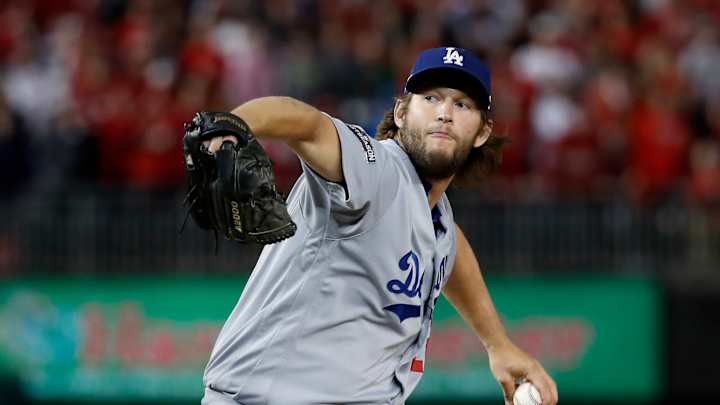Column: Dodgers-Nats shows baseball at its best - and worst

It was one of the most compelling postseason games in baseball history.
Too bad much of the nation had surely dozed off by the time it ended.
Simply put, the Los Angeles Dodgers beating the Washington Nationals in the decisive contest of the NL Division Series epitomized everything that's great about the playoffs - and everything that's wrong with a national pastime that drags on far too long.
When Dodgers ace Clayton Kershaw improbably ended the interminable classic with a strikeout for his first career save, Thursday had become Friday. The clock showed 41 minutes past midnight on the East Coast - a ludicrous time to conclude a sporting event when most fans surely had to be at work or school just a few hours later.
''One of the best games in history'' is how Dodgers first baseman Adrian Gonzalez described it for those still awake, and there's no arguing that point. If nothing else, you've probably seen a couple of replay highlights by now.
But it shouldn't have taken 4 hours and 32 minutes to complete, making this the longest nine-inning game in postseason annals. The seventh inning alone was like its own little game, taking up 66 minutes as the Nationals paraded one pitcher after another to the mound, six of them in all, in a desperate attempt to get three outs.
The drama was undeniable.
Too bad it was interrupted by all those trips to the mound, all those pitchers trotting in from the bullpen, all those requisite warmup tosses, all those batters stepping out of the box between every pitch, all those commercials filling up the dead air time for those watching at home.
As good as this game was, it raised a question that baseball has been grappling with for years: Why is this taking so long?
Let's start with Washington's Dusty Baker, who provided a textbook example of Overmanaging 101 in the seventh.
He's got his best pitcher on the mound, 20-game winner Max Scherzer, and a 1-0 lead as the inning begins. Granted, Scherzer had shown some signs of tiring, pitching out of a base-loaded jam in the fifth and giving up another hit in the sixth.
When Scherzer surrendered a leadoff homer to Joc Pederson in the seventh on his 99th pitch of the night, Baker decided that he no longer wanted his best pitcher in a 1-1 game. Who could blame him? This has become standard practice in an era of bloated pitching staffs filled with far too many guys playing specialized roles - an inning here, a batter there, all of it leading to endless pitching changes, double-switches and other time-consuming matters.
Afterward, Baker didn't have to defend whether he yanked Scherzer too soon.
Just the opposite.
''With Max at 98 pitches going into the seventh and a lefty at the plate in Pederson, did you at all consider pulling him then?'' a reporter asked, reflecting the way the game is played these days, to its detriment.
''No, I didn't think about pulling him then,'' Baker said. ''Max said he was still good. We were hoping to get another inning out of him. ... It's easy to say after the fact. If somebody had told me and Max that the guy was going to hit an opposite-field home run, we'd have taken him out then. But how do you take out your (best pitcher) ... in a 1-0 game? And Max is capable of going 100-some-odd pitches.''
After one bad pitch, he was done.
Marc Rzepczynski walked the next guy on four pitches and quickly got yanked. He probably didn't even need to shower. Blake Treinen faced two batters and retired one of them before he was pulled. Sammy Solis also faced two hitters, giving up the go-ahead hit to Carlos Ruiz. Shawn Kelley was summoned next, a move that totally backfired when Justin Turner tripled to the deepest reaches of center field, bringing in two more runs. After Kelley hurt his arm, it was left to Oliver Perez to get the third out.
The Dodgers took a totally different approach.
Less was more on this night.
In the bottom half of the seventh, after Washington scored a pair of runs, Los Angeles manager Dave Roberts went against the book - kudos for that - by going to his closer, Kenley Jansen, two innings earlier than normal. Jansen made it to the ninth with a 51-pitch outing, the longest of his career, before Roberts went totally off script by bringing his best pitcher out of the bullpen to get the final two outs.
Just 48 hours after throwing 110 pitches in Game 4, Kershaw finally ended the series by whiffing rookie Wilmer Difo, the last position player remaining on Washington's bench.
''The craziest game I've ever been a part of,'' a downcast Scherzer said.
No one would disagree with that.
This was baseball at its best.
And its worst.
---
Paul Newberry is a sports columnist for The Associated Press. Write to him at pnewberry(at)ap.org or at www.twitter.com/pnewberry1963 . His work can be found at http://bigstory.ap.org/content/paul-newberry .
